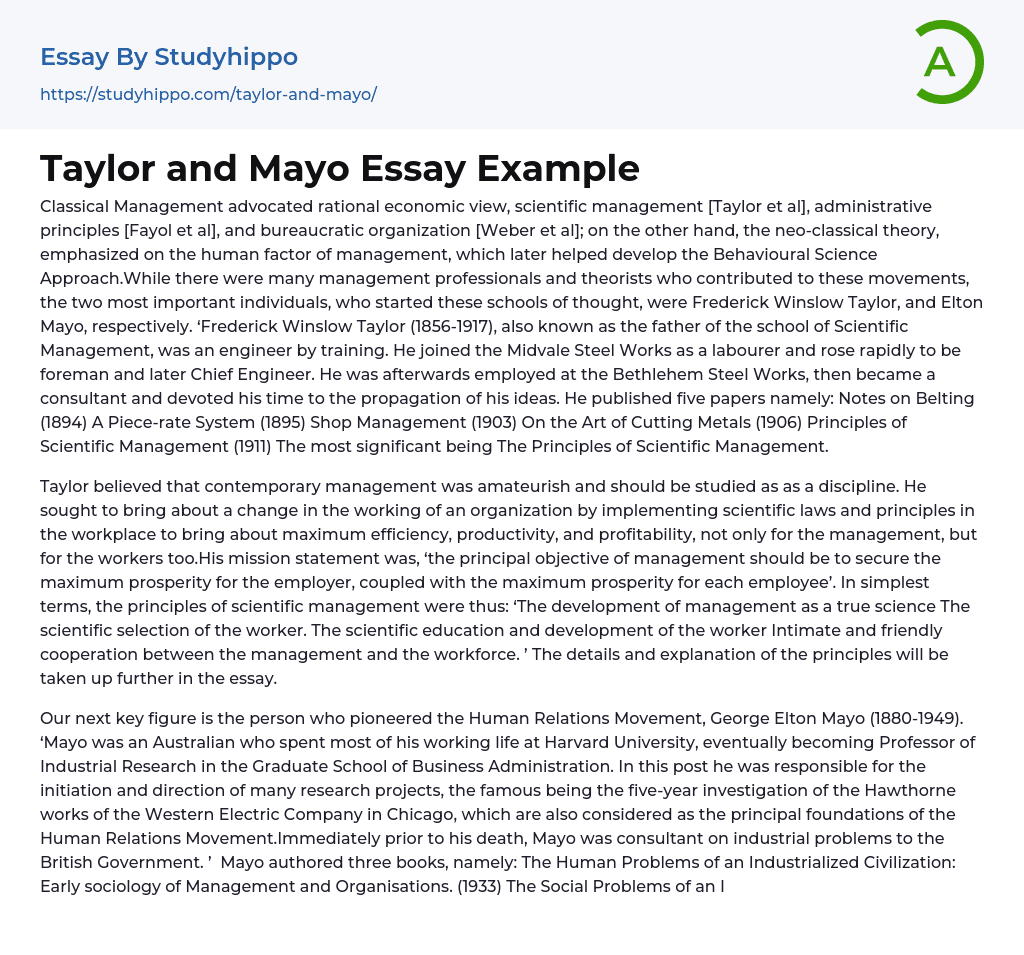Classical Management advocated rational economic view, scientific management [Taylor et al], administrative principles [Fayol et al], and bureaucratic organization [Weber et al]; on the other hand, the neo-classical theory, emphasized on the human factor of management, which later helped develop the Behavioural Science Approach.While there were many management professionals and theorists who contributed to these movements, the two most important individuals, who started these schools of thought, were Frederick Winslow Taylor, and Elton Mayo, respectively. ‘Frederick Winslow Taylor (1856-1917), also known as the father of the school of Scientific Management, was an engineer by training. He joined the Midvale Steel Works as a labourer and rose rapidly to be foreman and later Chief Engineer. He was afterwards employed at the Bethlehem Steel Works, then became a consultant and devoted his time to the propagation of his ideas. He
...published five papers namely: Notes on Belting (1894) A Piece-rate System (1895) Shop Management (1903) On the Art of Cutting Metals (1906) Principles of Scientific Management (1911) The most significant being The Principles of Scientific Management.
Taylor believed that contemporary management was amateurish and should be studied as as a discipline. He sought to bring about a change in the working of an organization by implementing scientific laws and principles in the workplace to bring about maximum efficiency, productivity, and profitability, not only for the management, but for the workers too.His mission statement was, ‘the principal objective of management should be to secure the maximum prosperity for the employer, coupled with the maximum prosperity for each employee’. In simplest terms, the principles of scientific management were thus: ‘The development of management as a true science The scientific selection
of the worker. The scientific education and development of the worker Intimate and friendly cooperation between the management and the workforce. ’ The details and explanation of the principles will be taken up further in the essay.
Our next key figure is the person who pioneered the Human Relations Movement, George Elton Mayo (1880-1949). ‘Mayo was an Australian who spent most of his working life at Harvard University, eventually becoming Professor of Industrial Research in the Graduate School of Business Administration. In this post he was responsible for the initiation and direction of many research projects, the famous being the five-year investigation of the Hawthorne works of the Western Electric Company in Chicago, which are also considered as the principal foundations of the Human Relations Movement.Immediately prior to his death, Mayo was consultant on industrial problems to the British Government. ’ Mayo authored three books, namely: The Human Problems of an Industrialized Civilization: Early sociology of Management and Organisations. (1933) The Social Problems of an Industrialized Civilization (1945)
The Political Problems of an Industrialized Civilization (1947) Mayo believed that an autocratic and authoritarian organization cannot achieve maximum efficiency and productivity from the employees.According to him, organizations and people needed each other, and is was important that both sides should achieve satisfaction. A democratic organization, where employee needs and opinions are taken into consideration, would function much more smoothly, than a rigid and controlling organization which didn’t give any scope for development or growth. He also emphasized on the importance of informal groups within the organization and urged the management to dig deeper into the issues of the employees and develop appropriate incentives accordingly. ‘Summary of Mayo’s Beliefs:Individual
workers cannot be treated in isolation, but must be seen as members of a group Monetary incentives and good working condition are less important to the individual than the need to belong to a group Informal or unofficial groups formed at work have a strong influence on the behavior of those workers in a group Managers must be aware of these ‘social needs’ and cater for them to ensure that employees collaborate with the official organization rather than work against it. The details and explanation of these beliefs will be taken further in the essay.
- Auction essays
- Balanced Scorecard essays
- Business Plans essays
- Expense essays
- Income essays
- Net Income essays
- Security Guard essays
- Singapore Airlines essays
- Battle essays
- Intranet essays
- Maintenance essays
- Simulation essays
- Inn essays
- Electronics essays
- Computer Science essays
- Consumer Electronics essays
- Enterprise Technology essays
- Hardware essays
- Robot essays
- engineering essays
- people search essays
- Modern Technology essays
- Impact of Technology essays
- Cloud Computing essays
- Operating Systems essays
- Information Technology essays
- Data Analysis essays
- Information Age essays
- Smartphone essays
- Cell Phones essays
- Camera essays
- Computer essays
- Ipod essays
- Mobile Phones essays
- 3g essays
- Bluetooth essays
- Cell Phones in School essays
- Computer File essays
- Desktop Computer essays
- Servers essays
- Data collection essays
- Graphic Design essays
- Data Mining essays
- Cryptography essays
- Internet essays
- Network Security essays
- Android essays
- Computer Security essays
- World Wide Web essays
- Website essays




